Andrea Phillips's Blog, page 11
November 19, 2015
Van Halen, M&Ms, and Accessibility Policies
Van Halen famously had a rider on their touring contract that stipulated there must be a bowl of M&Ms backstage -- with all the brown ones picked out. But despite appearances, this wasn't ego run amuck. That contract rider also had complex technical specifications for electrical systems, clearance, even how much weight the girders must be able to support.
Once Van Halen arrived to set up a show, any brown M&M was a quick red flag that the venue hadn't read the contract carefully, and so probably wasn't complying with those detailed technical requirements, either. And while a brown M&M might not be poison, those technical requirements were literal showstoppers. Electrical fires are not rock 'n roll.
This brings me to accessibility policies, and more specifically to Mary Robinette Kowal's pledge not to go to a convention that lacks such a policy. Seriously, stay with me.
Some years ago, John Scalzi made a similar pledge regarding harassment policies. At the time, I worried that participating would be damaging to my career -- when you're a tiny fish in a wide blue ocean, you have to take all the publicity you can get your grubby mitts on.
I've been to a lot more conventions since then, and here's what I've learned: the sort of convention that can't be bothered with a harassment policy is likely going to have serious organizational problems, weird politics, dull programming, or some combination thereof. It's true I'm very early in my career as an author, and I can't afford to miss out on promotional opportunities.
But the flip side of that is that as an early-career author, I pay my own way to conventions. I have only so much time and money to give, and there are so many, many conventions. So I need to budget carefully to make sure I get the most bang for my promotional buck. I really can't afford to go to a lousy convention.
Which means harassment and accessibility policies are increasingly important to me -- not just because they're morally right, not just because of my leftist SJW politics. Even if you're not worried about harassment yourself, even if you're not worried about accessibility yourself, if those policies are missing, that should be your brown M&M. The sign that what you're dealing with is very likely to be a shitty convention.





November 18, 2015
Awards Eligibility 2015
We have entered the time of year in which authors make lists of which works of theirs are eligible in which awards categories. I consider it a feminist act to promote myself and my own work, and so nothing short of an obligation. Accordingly, here are my awards-eligible works for 2015.
Novel
Revision
Short Story
In Loco Parentis
Children of Rouwen
Antaius in the Heavens Among the Stars
The McKinnon Account
This was my publishing debut year, and so I am also eligible for the Campbell Award for New Writers. This may come as a surprise to long-time readers, since I've been a professional writer for many years now. But none of those works count as publication under the Campbell's rubric, because every scrap has been for a game, marketing campaign, self-published, or non-fiction. None of those works start your Campbell clock. But now? Tick-tock, friends.





November 5, 2015
Revision: An Artist's Statement
As of today, Revision has been out for six months. OMG! Has it been that long? ...Has it only been that long?
To celebrate, I wanted to do two things. One is announce a price drop! Revision ebooks are now $4.99, available for Kindle, iOS, Nook, and Kobo. Maybe buy it if you haven't? Maybe leave a review?
Beyond that, this seems like a good moment to reflect on how Revision has been received, how I feel about it, and a little bit about what I was trying to accomplish creatively.
First: reception. I really couldn't have asked for a better set of reviews. I got a freakin' star in Publishers Weekly! NPR Books liked it! Even Kirkus was super positive! This was very much the best-case too-good-to-really-hope-for scenario.
The book hasn't made me wealthy, mind. It's selling persistently, which is really wonderful; if I'd self-published, sales would have stopped dead about five months ago. Nonetheless, a debut author and a debut press with limited marketing bandwidth can only do so much, so selling hundreds of thousands of copies was never plausible. We're definitely punching above our weight class, though, and I am very pleased all around.
And now, if I may, something in the way of an artist's statement. In particular, I'd like to address the most common topic in reviews of Revision: whether or not Mira (the protagonist and narrator) is likable.
I started writing Revision in 2009 during the throes of Racefail, and my subconscious was steeped in the scorching hot issues of race, class, gender, sexuality. The subconscious, it leaks into your work, it turns out. As such, Revision is very much a not-even-that-thinly-veiled metaphor about coming to terms with the ugly fact of your own privilege, even if you don't want it. How you can't walk away from it, even if you're trying.
A lot of reviewers weighed in on whether Mira is likable or not; and many of them further noted that the requirement for a female protagonist to be likable is a little sexist. I have realized, with great soberness, that likability of my female characters is something I'll have to consider more thoughtfully in the future, with an eye to selling more widely.
But this book in specific couldn't have come from a likable place, or been about a likable person. The emotional arc of Revision is very much about how someone who has advantages in life has the power to ruin everything for the vulnerable people around her, while remaining personally more or less unscathed. It's not a kind story or a nice story or a fuzzy story, but it's a human story: the paths people take to noticing the suffering around them. The way someone might need to suffer a little first to be able to recognize it in someone else.
It's a very honest book. Honest and painful and yeah, probably unflattering.
Beyond that, there are other things I was trying to do, like paint only in shades of gray. Nobody in this book is purely evil, nor purely good. Truth and morality are ambiguous creatures anyway -- human constructs that don't exist outside of our minds.
And in a move that I was afraid would make nobody ever buy the book or take it seriously, the voice embraced a downright aggressive femininity, and I tried to be brutally honest about what it's like to be a woman in the world, too. It was important to me to include friendship between women. Bad, complicated relationships. The terrible decisions people make out of fear, convenience, comfort, simple short-sightedness.
There is some wish fulfillment about burning down a server closet.
It's a book with a lot going on under the hood, is what I'm saying. And the kicker is, it's not at all on purpose! For all that I'm telling you what the book is about now, that was all the doing of my busy, busy subconscious. I 100% thought I was writing a fluffy action novel in that first draft. I imagine you can read it purely as an action novel, too. But then I guess you... might not like Mira so much. She's not really a model human being. Though who among us is, in our heart of hearts?
Anyway. It's a book! I am very, very proud of it. I think it's solid work. If you haven't picked it up yet, well! It officially costs only as much as the proverbial latte these days. Give it a shot?





October 19, 2015
Reading Habits Survey 2015
I have some, shall we say, strong reading preferences at this point -- in particular, I tend to prefer shorter books, and books that aren't a part of a series. But I am only a single data point, and in conversation with the clever and thoughtful Sunil Patel, I got to wondering how representative of current reading tastes I am.
So I thought I'd ask.
The survey asked only seven questions, and I put the call out on social media, so I can't guarantee that the self-selected set of respondents here, who are all connected to my own social network at some degree of remove or another, are representative of all readers. Summarized here are the data I collected. (Pardon the inconsistent chart formats -- some are SurveyMonkey screen shots, and some I built separately in Excel.)
First off, unsurprisingly, basically everyone who participated in the survey considers themselves to be a book reader. Out of 505 responses, only 15 people answered "no" or "not sure."

So just about everyone self-defines as a reader, but what does that mean in practical terms? How many books are we talking? Or more specifically: how many books did you read last year?
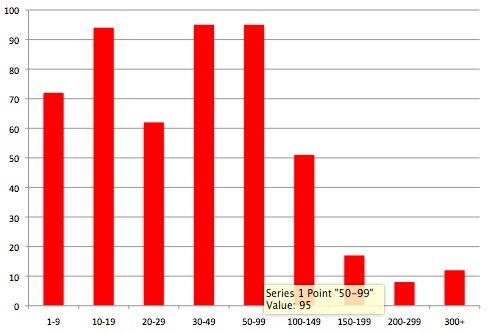
How many books did you read in the last 12 months? The X axis is books read last in the last year; Y is how many respondents answered for each range.
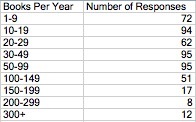
...Wow. People who read, it turns out, read a loooooot of books. Roughly a third of our readers went through between one and twenty books last year, and another 40% read between 30 and 100. And a shocking-to-me number of people reported reading 100, 200, even 300 books in a year. The maximum number reported -- and not a unique one -- was 500. Respect. Where do you find that much time?!
Next, I thought I'd ask about ebooks. What percentage of the books you read last year were ebooks? So this was interesting -- unsurprisingly, a large number of readers won't touch ebooks. A much smaller number read ebooks exclusively. Zero-ebooks brought 97 respondents, and only 50 said 100 percent.
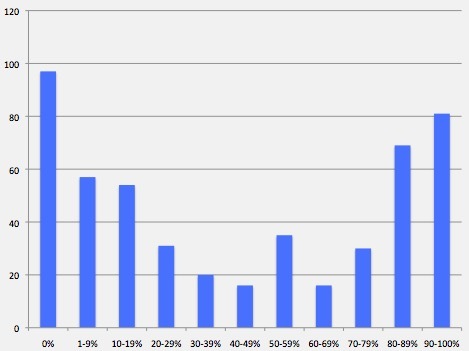
What % of books you read in the last 12 months were ebooks? (in # of respondents)
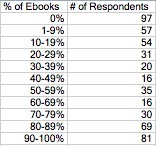
It bears noting, though, that a lot of books simply aren't available in ebook format, and sometimes pricing is prohibitive on one format or another, so a cost-conscious consumer may flip back and forth. And yet! Very, very few people are comparatively willing to read either format equally. Notice that dip in the middle. The majority of readers responding want their books the way they like them. So much for the death of print, huh?
Next up was an analysis of what genre our readers prefer. I'd expected a majority of science fiction and fantasy readers, since I put the call for survey responses out on Twitter and I run in a lot of circles that skew toward those genres. But in fact our reading tastes are deliciously promiscuous.

In retrospect I might have found better results for the later questions about series by limiting the responses to genre fiction, but frankly I was curious how much nonfic and literary fiction crossover reading occurs. It looks like... quite a lot.
And that "other" category proves some substantial oversight on my end, or at least grounds for debate about what makes a genre. Of the 112 respondents answering "other," 40 wrote in some version of Young Adult. Other genres often mentioned include religious, erotica, and historical, and quite a few respondents used that space to specify very specific subcategories of readership ranging from steampunk to sewing. A very few respondents chose to mention non-genre-specific reading preferences, too, like seeking out black novel protagonists, YA books including trans characters, or Canadian authors.
And now we get on toward the initial questions I had when I started this endeavor -- of all of those many, many books being read, what percentage of them are in series?
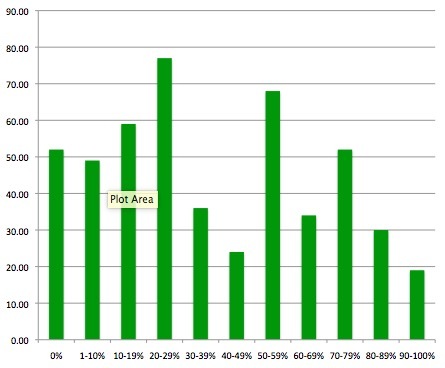
What % of books you read in the last 12 months were part of a series? (in # of respondents)
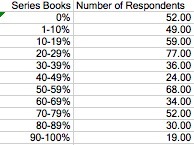
It's hard to come away with a solid conclusion out of this one. Roughly 10% of our readers didn't read any series at all, and about 60% say that series books make up half or less of their reading material. I'd interpret this to meant a slight preference against series works -- but given that many of our respondents read lit-fic, nonfiction, and other genres in which series are not a widespread practice, it's difficult to determine what this means in actionable terms.
So why don't we ask about that directly: how do various factors affect your decision to begin reading a book or not? Note that we're specifically not asking about marketing nor economic concerns -- I didn't want to muddy the waters, but in the long run it's likely that considerations like price and word-of-mouth trump other considerations entirely.

We see few surprises here. Around 88% of readers are more likely or much more likely to read a book if it's part of a series they've read already, and very, very few people say otherwise. This is especially interesting considering that series attrition is a known phenomenon -- people definitely do stop reading series in the middle, and many a series has never reached completion as a result. This may well be a case where what we think we would do is at odds with what we actually do.
Moving on, there's a slight preference toward a book that is the first in a series, but it's only around 5%. There's a much stronger preference toward the first book in a completed series; about half of readers are more likely or much more likely to read the first book in a series after the last book has been written. So people... like series, basically. I guess that shouldn't be a surprise; they wouldn't be published if nobody was buying.
In retrospect, I should have asked separately how people feel about standalone books in particular. I originally thought that more/less likely to read a book in a series would make that answer visible in the negative space, but I don't think the data is clear enough to allow any such conclusions to be drawn.
And then there's the length question. I may be unusual in preferring standalone books, and roughly two-thirds of readers don't care one way or another how long a book is. But of that third that care, it looks like there is indeed a bias away from longer works. about a quarter of readers say they're less likely or much less likely to read a book over 500 pages, where only about 12% say they're more or much more likely.
There is a slight bias toward shorter books, on the other hand. Around 15% of respondents say they're less likely to read a book under 300 pages, but around 20% say they're more likely. That's not enough to commit to writing shorter books alone, but it certainly does mean there's space in the market for quicker reads.
The self-pub question was an afterthought. It looks like some stigma remains, and over half our readers are less likely or much less likely to read a book that's been self-published. On the flip side, only 12 readers out of 507 said they'd be in any way more likely to read a self-published book. But the bright side here for our direct-to-reader authors is that 43% of readers simply don't care how you were published one way or the other.
A more mathematically savvy analyst than I might be able to look at those responses and determine if there is a relationship between readers who are willing to give self-pub a shot and those who prefer ebooks. If you'd like to look at the data and run that analysis (or any other), shoot me a line and I'll give you the raw data -- minus the email information for people who wanted to be contacted when this post goes up, of course.
And finally a gimme: are people more likely to buy a book if they know the author on social media? Heck yeah, they are -- 4% of people said they were less likely, but a whopping 70% said they were more and much more likely. So it looks like all that time spent nattering around on the Facebooks and Twitters really does get you in the door.
Annnnnd that's the 2015 Reading Habits Survey. Some surprises, some really not surprises, and a whole lot of "result inconclusive, ask again later." Which does, at least, answer my original question -- my preferences aren't common, but I'm not alone, either. Readers are a diverse bunch, and like a whole lot of different things. And I find that a comforting piece of information: there's plenty of room in publishing for all of us.





September 30, 2015
Agent'd!
Here's another piece of news I've been sitting on for... quite a while, actually, because it still doesn't feel entirely real and I have representation trauma or something. but! Guess what! I have a new agent! I am beyond delighted to say I am now represented by Zoe Sandler at ICM.
You guys. You guys. This has been a revelation for me, because Zoe is straight-up excited about the fiction I'm writing and the ideas I have. I showed some comments she'd given me to an author friend, who commented they wished they got emails like that from their own agent. Sparkles! Joy! I don't feel like talking to her is begging favors or imposing, you know?
I'm pretty sure this is what an excellent agent-author relationship is supposed to look like.
And not just touchy-feely, either -- it's working on the business side. So far she's sold Taiwanese rights for A Creator's Guide and negotiated some work for me with Serial Box, the details of which are still shhhhhh very secret, we'll be talking about that more later. And we'll probably be putting a new novel manuscript on the market in the next couple of months. Editors, keep your eyes peeled.
So going forward, if you want to hire me to design games or marketing work, you should still talk to me. But if you'd like to publish my next novel, make an audiobook for Revision, option Lucy Smokeheart to make an animated series, or translate A Creator's Guide into Finnish, talk to Zoe. She's awesome! It will be terrific.





September 29, 2015
Tales of the Stop
I am sitting on a mountain of awesome things right now, my friends. Things I have not yet told you about, but will be talking up in the coming weeks! And thing #1 is: Tales of the Stop. If I may steal a few words from the project creator as written over at Chuck Wendig's place:
A few years ago, I wrote a story called Azrael’s Stop. It’s a fantasy story about a teenager named Ceph who’s had to deal with a lot of death in his life—his whole family, a childhood friend, his best friend from school… And it’s kind of fucked him up. He thinks that everyone he loves is going to die, and so he won’t let himself get close to anyone.
Then a mysterious man brings him to a bar called Azrael’s Stop—said to be the watering hole of the Angel of Death Himself—and sets him up as the bartender. People start coming to the bar, people who are either ready to pass on from this world and just need someone to share their story with, or people who, like Ceph, have experienced death and need help dealing with it.
I have a short story in this volume called Changed and Changing. As with much of my short fiction over the last few years, it is thematically about the complexity of motherhood. I think it's a lovely, sad little piece, and I would enjoy it if you would read it and let me know what you think. (Note that it's also in my own collection of shorts Shiva's Mother and Other Stories if you've read that before, but I'd prefer if you buy Tales at this point. And if you liked Changed and Changing from the other collection, well! You'll definitely like the rest of the anthology!)
I know Lucas J.W. Johnson from way back in the transmedia salt mines, and I've always admired him for the way he thinks big and then acts on those visions of his. Azarael's Stop is a transmedia project start to finish; go and read that post at Terrible Minds to see learn more about its creative vision and implementation. It's worth your time, I promise.
And then buy Tales of the Stop! This book is available in all the stores for the low price of $4.99! LOOK AT THESE BUY LINKS: Amazon | B&N | iBooks | Kobo or buy it from Lucas directly as a discounted bundle at Silverstring Media!
More awesome things incoming. Stay tuned!





September 25, 2015
On Not Being on a Diet
I should be on a diet.
I should be on a diet because that's what women do, right? The beauty ideal is unfair and unrealistic, we tell each other, nodding knowingly. And despite this knowing, still we look at carb counts or calorie counts and plan weeks around nutrition bars or cabbage soup. We vow to have less and be less than before, as a matter of necessity and of virtue.
I should be on a diet, more specifically, because I have gained weight. Shocking! Terrible! This is the inevitable result of the reglutening -- it turns out when you allow pastry back into your diet, well, your body changes. You put on a few pounds, and then a few more.
Right now I weigh perhaps 170 pounds. For perspective, at the height of pregnancy for my second child, I weighed 175; for the first I had reached 200, an arbitrary psychological breaking point that decides many a woman's sense of self-worth. In non-pregnant times, my weight has tended to hover around 150 pounds, give or take the eternal five. This would put me at twenty above what might be a baseline number.
Or in the modern parlance: I should lose twenty pounds, yes?
There are problems that come with gaining weight. Well, one problem. Clothes that had previously fit me no longer fit me. Waistbands are tighter. Jackets no longer button. Shirts and coats ride up where they should not.
Presumably it would be a simple enough matter to remove gluten or indeed carbs or sugar from my diet, and then those pounds would slowly vanish again, like mist fading into morning. But I have lived that life, and on reflection, I would prefer the joyous life where I can bake bread with my children, where I can have a bagel on a lazy Saturday morning, where I can have the cupcake at my daughter's birthday party. If the cost of those experiences is twenty pounds, then so be it.
I look in the mirror and I am satisfied with what I see. I am not unattractive; indeed, in my 40s, I have finally made peace with a generous backside that a shifting beauty standard now celebrates, the same body part I despaired of in my teens for being entirely too enormous. The irony is not lost on me.
My husband loves me, my children love me. My work does not suffer for five pounds nor for twenty, and I am confident it would not for a hundred, either. It is telling that I am not dissatisfied with my body, but that I feel like I should be.
We've done a number on each other, haven't we?
I do not have mobility problems. I do not have high blood pressure or low stamina; I do not have diabetes or high cholesterol. I feel like I should be on a diet, but what problem would that solve? Only the problem of clothes fitting. And there are other ways to solve that problem, come to think of it.
Last week I bought jeans in a larger size than I had worn before. They are soft and loose and they fit my body as it stands. I'm wearing them right now. They're comfortable. And I'm comfortable.
I should be on a diet, I guess, because I'm supposed to be on a diet. But I'm not. And that's probably OK.





September 19, 2015
The Complete Adventures!
AVAST! Today is Talk Like A Pirate Day, so it is only just and fitting that today is the official launch for The Daring Adventures of Captain Lucy Smokeheart: The Complete Adventures! This all-new edition includes all twelve gorgeous cover illustrations without the pesky title text for your max enjoyment of Heather Williamee's art, a solve appendix that gives you the answers to all the puzzles and how to get to them, and a second appendix that decodes Captain Robert Carver's journal entries, which are what you get on the website if you solve the puzzles!
You can find The Complete Adventures in ebook format for $6.99 on Amazon, iTunes, or directly through me on Payhip.com! Barnes & Noble and Kobo are coming soon, and for the same price. There's also going to be a paper edition, but alas production on that got held up a little too long to make today.
But! If you want to hold off, the black and white trade paperback edition will cost $14.99 and comes with Amazon Matchbook for FREE, which means if you buy the paper edition through Amazon, you can also have the ebook for free through Amazon! Huzzah!
I'll keep you posted as editions trickle out. But for now: Happy Talk Like a Pirate Day, matey! Blue skies and smooth sailing on your adventures!





September 17, 2015
Community Building Panel!
I don't do a lot of speaking these days, but when I do, I pick and choose very carefully -- which is how you know the StoryForward NYC panel on the art of community building is going to be SUPER AWESOME.

This session is going to be 100% snake oil free, guaranteed. We're not going to be all "yeah it's important to build a community, you have to engage people, man, the secret is to build content's really engaging," which is nice and all. It's even accurate (mostly), but it doesn't get you any closer to actually knowing how to do that thing. We are going to talk about how to do that thing! Actual useful techniques and methods! Things you can try! I want you to walk out of there with at least three concrete ideas for how to build and manage a community of your very own.
And speaking of community: StoryForward is a fantastic, warm, supportive community of creators, and you should join the meetup so you know when the next shindig will be, too. It's my perpetual regret that I can't make it to every single one, usually due to family-related scheduling conflicts.
The details: it's this Monday Sept. 21 from 6 to 7:30pm. There is an admission cost, but it's only one lousy dollar. It's at New York Women in Film and Television at 6 East 39th St., Suite 1200. In New York, of course.
There's not a ton of room in the venue, so please RSVP at Meetup.com to reserve your space. And it's going to be so great. So great! Hope to see you there!





September 10, 2015
Dynamic Loot in Our Time
I'm doing a playthrough of Dragon Age: Inquisition right now, and I keep running into The Loot Problem. On the one hand, 95% of everything I get is well beneath my level and current capabilities. This is a problem common to lots of RPGs, and even MMOs. From my mom on Facebook, which got me thinking about this:

(Apple doesn't fall far from the tree.)
But I also just finished the DA:I Descent DLC, and apparently a few levels early -- so I have the opposite problem, carting around a bunch of super great weapons and armor I won't be leveled up enough to use for some time to come.
I feel like loot drops mapped more closely to the player's current capabilities are a thing whose time has come -- and especially in a single-player game. It's not *super* hard to programmatically make it so that a boss drop or a level treasure chest always yields something % 5 better than what you came in with. A lot of games do this with the actual monsters already, right? And it would neatly solve a lot of linearity problems RPGS have, where they don't want to tell you which place you have to go next... but if you go there first, man, you're gonna get squished.
So why not make all of it dynamic? And then the player is guaranteed to get the zingy feeling of always progressing in power and capability over the course of the game.
It's a little more complex in an MMO, of course, because you don't want people grinding an easy boss to get ever-better weaponry. But if you lock the loot a boss or an area will drop to the level of the character performing the looting when it first mastered that area, then you can still guarantee the first time will be amazing, while also guaranteeing diminishing returns for the grind.
It's a thought, anyway. And I'd be surprised if it hadn't been tried already. Anybody know an example?








